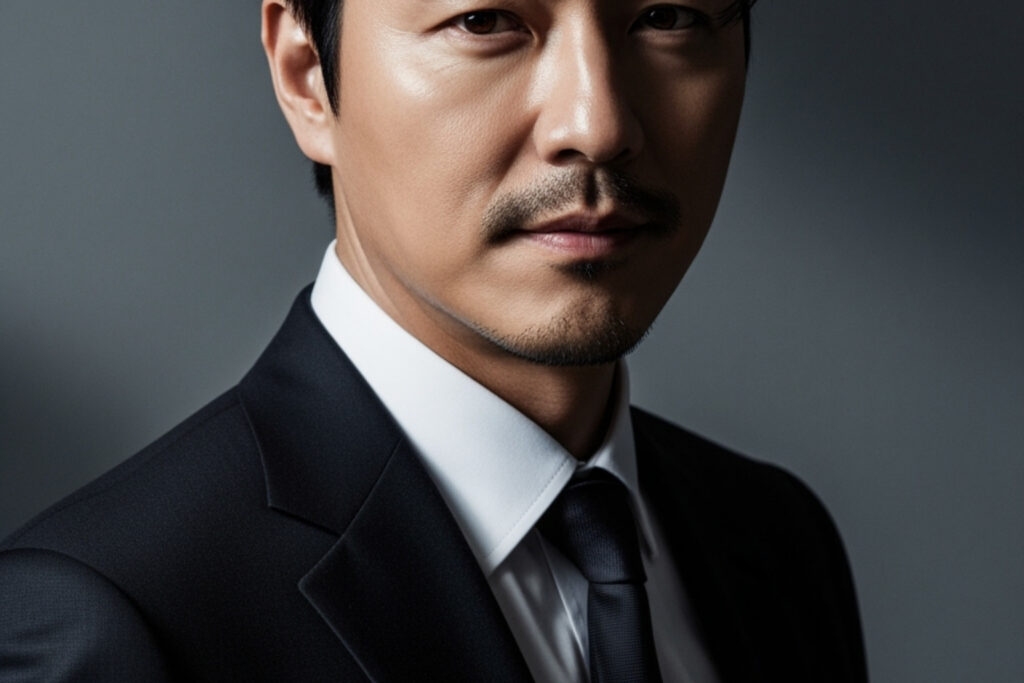Why Lee Byung-hun is South Korea’s Most Recognizable Global Star
Lee Byung-hun stands as one of the most successful actors to emerge from South Korea’s entertainment industry. With a career spanning over three decades, he has become a face of the Korean Wave (Hallyu) and one of the first Korean actors to achieve genuine Hollywood stardom. His journey from a struggling young actor to an international icon mirrors South Korea’s own rise as a global cultural powerhouse, with its influence felt globally.
Quick Facts About Lee Byung-hun:
- Born: July 12, 1970, in South Korea
- Career Start: 1991 with KBS drama “Asphalt My Hometown”
- Major Breakthrough: “Joint Security Area” (2000)
- Hollywood Debut: “G.I. Joe: The Rise of Cobra” (2009)
- Recent Fame: The Front Man in Netflix’s “Squid Game” (2021)
- Awards: 46 wins and 38 nominations throughout his career
- Languages: Fluent in Korean, English, French, and Mandarin Chinese
He was the first South Korean actor to present an Oscar at the Academy Awards and remains one of only two Korean actors honored with a hand and footprint ceremony at Hollywood’s Chinese Theatre. His versatility shines through diverse roles, from the ruthless crown prince in “Beautiful Days” to the mysterious Storm Shadow in the “G.I. Joe” franchise and the enigmatic Front Man in “Squid Game.” This range earned him Gallup Korea’s Actor of the Year award in both film (2012) and television (2018). Beyond acting, lee byung-hun has made significant philanthropic contributions, making him a cultural ambassador for South Korea worldwide.
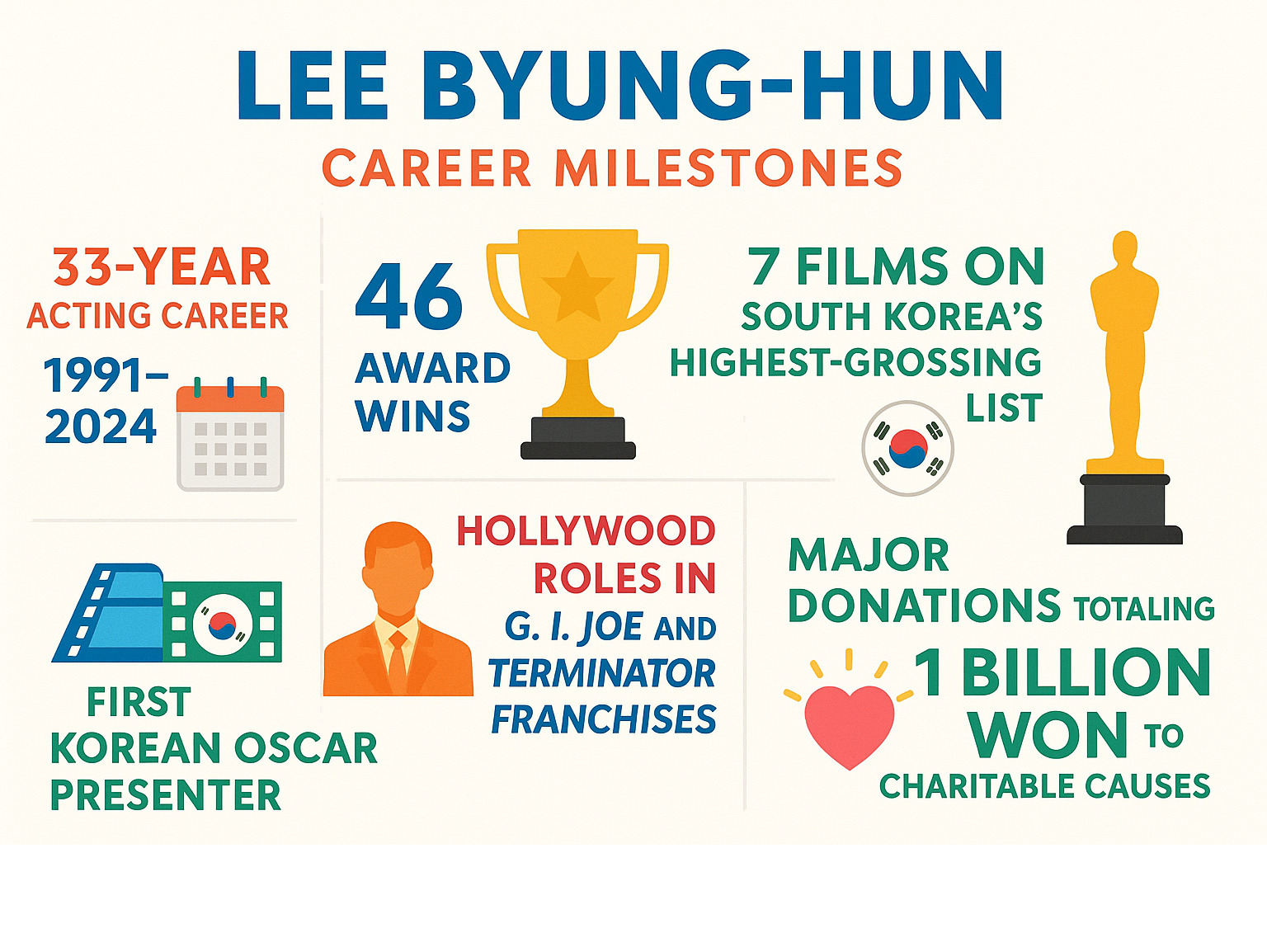
From Humble Beginnings to Stardom: The Making of a Korean Icon
Every global superstar has a beginning. For Lee Byung-hun, born July 12, 1970, that start was unexpected. He never dreamed of becoming an actor until a friend of his mother suggested he audition for KBS television network in 1991. With no experience, his raw talent landed him his first role in Asphalt My Hometown.
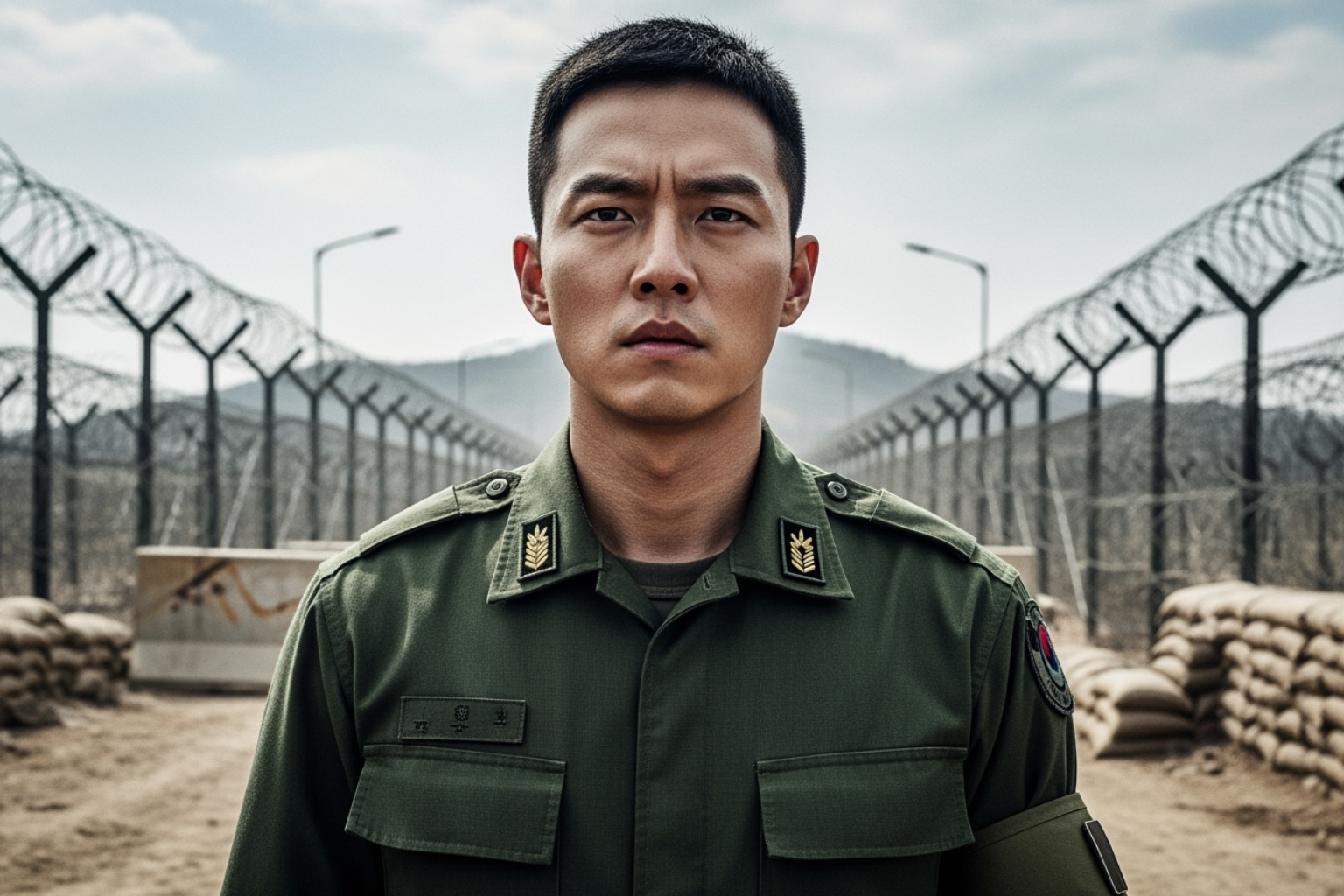
Initially a French major, he later studied theatre and cinematography, and his background in Taekwondo proved invaluable for future action roles. The early years were challenging, with his first films being unsuccessful. After his father’s death in 2000, lee byung-hun channeled his pain into his craft, using television as a proving ground.
Breakthrough Roles of Lee Byung-hun in Korea
The year 2000 was his defining moment with Joint Security Area (JSA), which became the highest-grossing Korean film of its time and proved he could tackle complex roles. His subsequent work showed remarkable range, from the emotional depth of Bungee Jumping of Their Own (2001) to the pan-Asian hit drama All In (2003) and the critically acclaimed A Bittersweet Life (2005). He showcased his flair for action in The Good, the Bad, the Weird (2008) and the blockbuster drama Iris (2009), where he earned a reported 100 million won per episode.
Rise as a Hallyu Star
Lee Byung-hun became a pioneer of the Hallyu Wave—Korea’s cultural export phenomenon that has given us everything from K-pop to the Korean culinary boom enjoyed worldwide. His appeal was particularly strong in Japan, where fans nicknamed him “Byonsama.” As a testament to his star power, he sold out a 45,000-seat stadium in Japan for a single fan meet. This pan-regional appeal, along with his business acumen in founding BH Entertainment, set the stage for his move to Hollywood.
The Global Leap: How Lee Byung-hun Conquered Hollywood
For many Korean actors, Hollywood is a dream, but for Lee Byung-hun, it became a reality. His transition was marked by significant roles that made him a recognizable face to Western audiences. His debut came in 2009 as the ninja Storm Shadow in ‘G.I. Joe: The Rise of Cobra’, a role he reprised in the 2013 sequel, ‘G.I. Joe: Retaliation’.

His international filmography quickly expanded:
- Red 2 (2013): He held his own alongside legends like Bruce Willis and Helen Mirren, and his influence helped make Korea the film’s second-highest-grossing market.
- Terminator Genisys (2015): He took on the iconic role of the T-1000, proving his capacity for portraying one of cinema’s most memorable villains.
- The Magnificent Seven (2016): As the knife-wielding assassin Billy Rocks, his quiet intensity and impressive action sequences made him a standout in a star-studded cast.
Despite his success, he faced challenges, including reported instances of racism. The persistence of lee byung-hun in the face of such adversity is commendable and highlights the problems many non-Western actors face.
Paving the Way for Korean Actors
Beyond his own roles, Lee Byung-hun has been a trailblazer. His achievements are significant milestones for the Korean entertainment industry, increasing the visibility of its cinema in major cultural hubs. He was the first South Korean actor to present an Oscar and later became a member of the Academy. In 2012, he and Ahn Sung-ki became the first Korean actors honored with a hand and footprint ceremony at Hollywood’s Chinese Theatre, a profound recognition of their international appeal. You can follow his journey on Lee Byung-hun’s official Instagram.
A Master of the Craft: Acclaimed Performances and Major Accolades
What truly sets Lee Byung-hun apart is his ability to disappear into every character. His incredible range is perhaps best showcased in ‘Masquerade’ (2012). In the dual role of a tyrannical king and his humble doppelgänger, he delivered a career-defining performance that helped the film break box-office records.
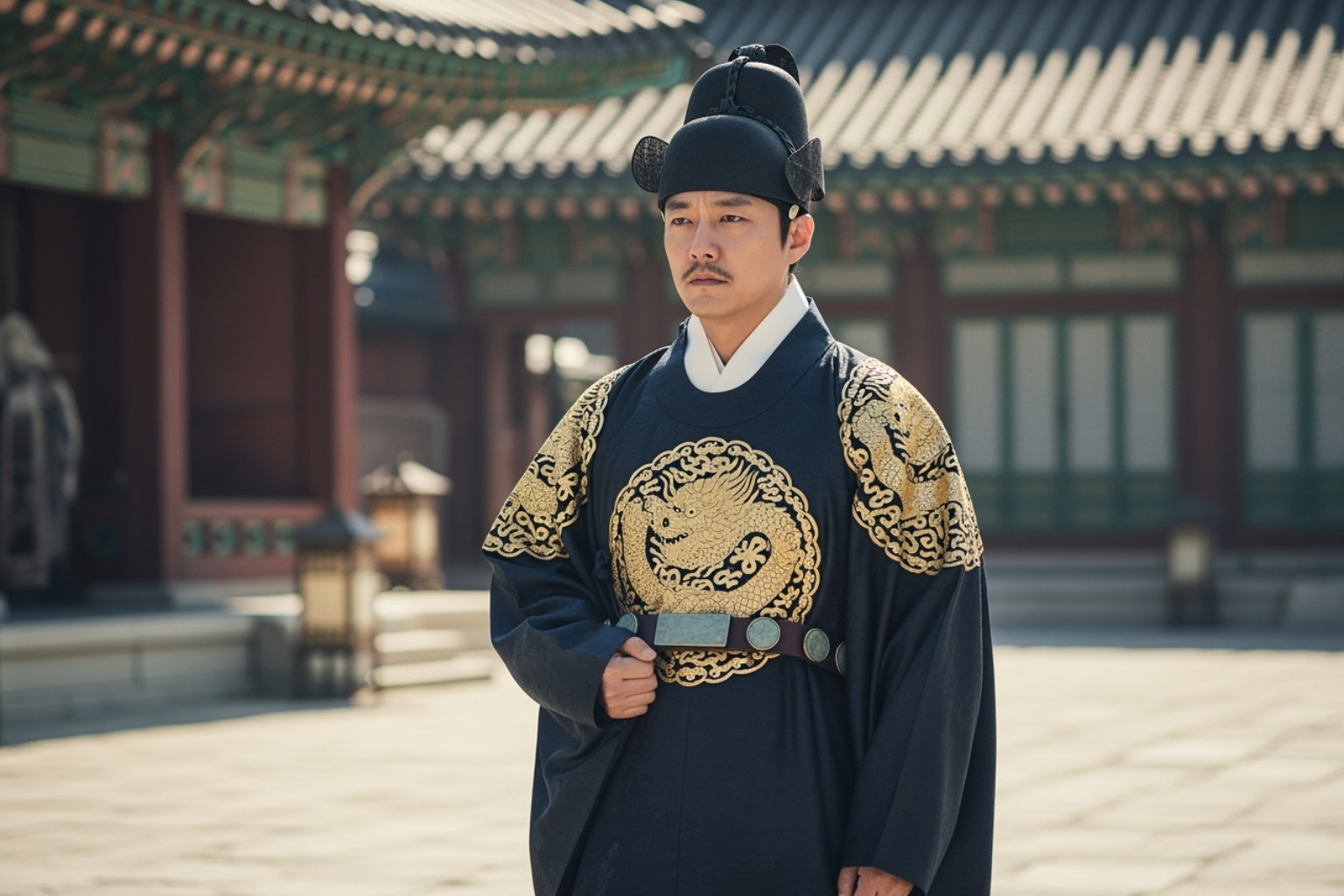
His versatility continued in the gritty political thriller ‘Inside Men’ (2015) and ‘The Man Standing Next’ (2020), South Korea’s Oscar submission. He returned to television with the epic historical drama ‘Mr. Sunshine’ (2018) and captivated global audiences as the enigmatic Front Man in Netflix’s phenomenon ‘Squid Game’ (2021). In ‘Squid Game’, lee byung-hun conveyed volumes with minimal dialogue, interpreting the character with fascinating depth. His ensemble work in ‘Our Blues’ (2022) further proved his talent.
A Shelf Full of Trophies
The recognition Lee Byung-hun has received speaks volumes. With 46 wins and 38 nominations, his trophy case is filled with Korea’s most prestigious honors. He has won top awards at the Baeksang Arts Awards, Grand Bell Awards, and Blue Dragon Film Awards for roles in films like ‘Masquerade,’ ‘Inside Men,’ and ‘The Man Standing Next.’ Tellingly, Gallup Korea named him Actor of the Year for both film (2012) and television (2018), a rare achievement highlighting his unique cross-medium appeal. The APAN Star Awards also recognized his work in ‘Mr. Sunshine,’ cementing his status as a peer-, critic-, and audience-acclaimed star.
Beyond the Screen: Philanthropy, Business, and Personal Life
Behind the camera, Lee Byung-hun is an astute businessman and dedicated philanthropist. He founded and leads BH Entertainment, a major talent agency where he nurtures the next generation of Korean stars, giving back to the industry that made him famous.
His philanthropic efforts are equally impressive. He has consistently donated hundreds of millions of won to various causes, including a 700 million won donation for Japan’s 2011 earthquake and tsunami relief. His generosity extends to disaster relief, children’s hospitals, and COVID-19 support, demonstrating a deep and heartfelt commitment to helping others.
The Personal Life of Lee Byung-hun
Lee Byung-hun‘s personal life has been as dramatic as his on-screen roles. His marriage to fellow actress Lee Min-jung on August 10, 2013, was a major event in Korea. Together, they have a son and a daughter and have built a loving home despite intense public scrutiny.
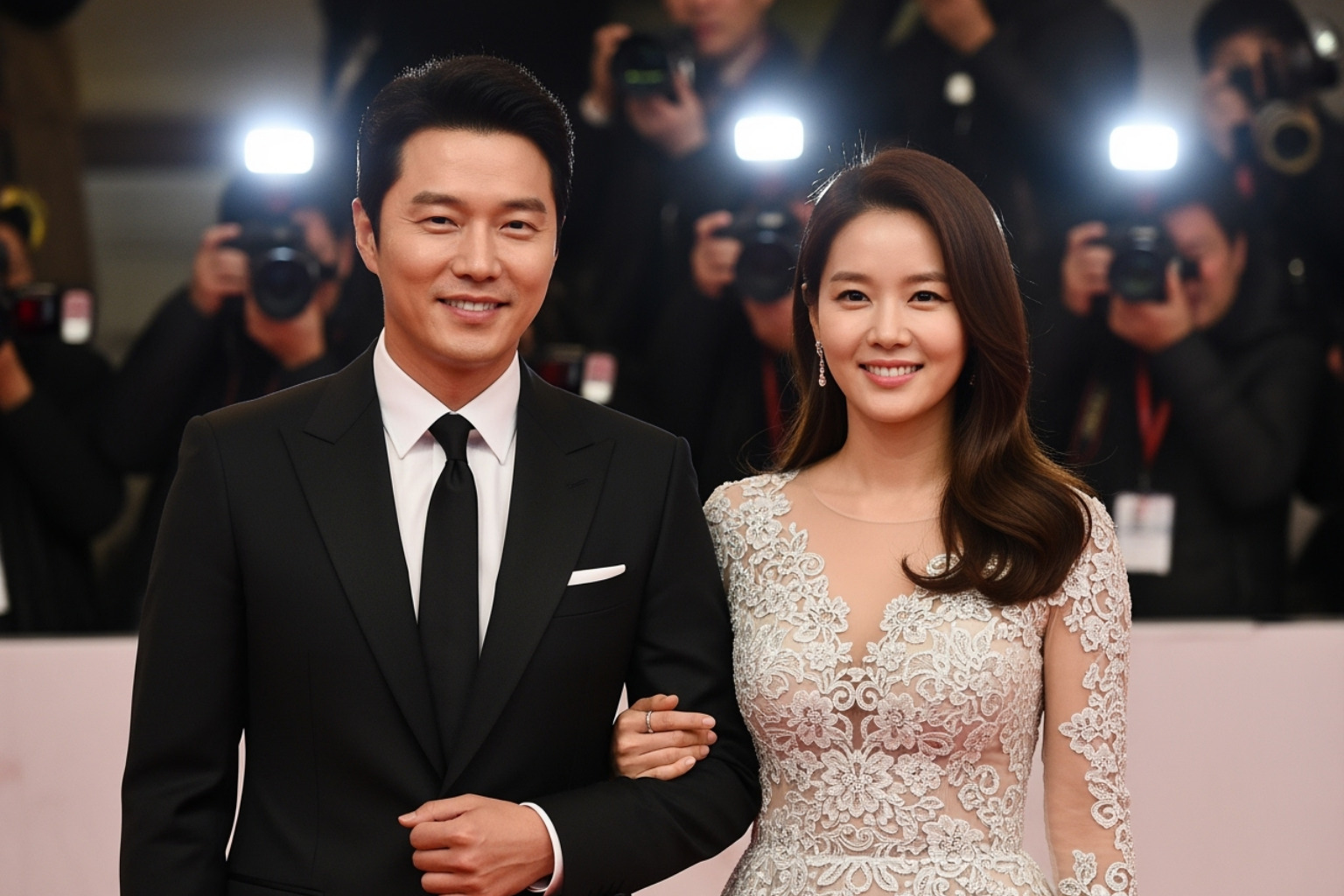
However, his path hasn’t always been smooth. In 2014, he faced a significant challenge with a blackmail scandal that led to intense media scrutiny and a temporary career setback. What’s admirable about lee byung-hun is how he faced the difficulties head-on, managing a remarkable comeback. These experiences, combined with earlier family financial difficulties and the pain of his father’s death, have undoubtedly contributed to the depth and authenticity he brings to his roles.
What’s Next for a Global Superstar?
After more than three decades in the industry, Lee Byung-hun shows no signs of slowing down. His recent work includes the disaster thrillers Emergency Declaration (2022) and Concrete Utopia (2023), the latter being South Korea’s official submission for the 96th Academy Awards. These projects prove he continues to choose roles that challenge both himself and audiences.
Fans are most excited for his upcoming projects. He will reprise his role as The Front Man (In-ho) in Squid Game Season 2, arriving in 2024. His character is expected to have a more prominent role, diving deeper into his mysterious backstory. Other anticipated projects include The Match (2024) and The Ax (2025), which reunites him with legendary director Park Chan-wook. Lee Byung-hun is also expanding his influence as a producer for I Believe In A Thing Called Love.
His ability to move between global productions like Squid Game and acclaimed Korean films proves his international superstardom. He continues to bridge cultural divides, bringing Korean stories to global audiences while maintaining his roots in Korean cinema. The future looks incredibly bright for this remarkable talent.
Frequently Asked Questions about Lee Byung-hun
As one of Korea’s most beloved global stars, fans have plenty of questions about Lee Byung-hun. Here are answers to the most common ones.
Who is Lee Byung-hun’s wife?
Lee Byung-hun is married to fellow South Korean actress Lee Min-jung. They wed on August 10, 2013, and have two children, a son and a daughter. They are known for balancing their high-profile careers with a private family life.
What is Lee Byung-hun’s most famous movie?
While it’s hard to pick just one, his 2012 historical drama ‘Masquerade’ is one of his most famous films in Korea, becoming a massive box-office success. For international audiences, lee byung-hun is widely recognized as Storm Shadow in the ‘G.I. Joe’ franchise and the T-1000 in ‘Terminator Genisys’.
Was Lee Byung-hun in Squid Game?
Yes, Lee Byung-hun played the pivotal role of The Front Man, the masked overseer of the deadly competition in Netflix’s global hit, ‘Squid Game’. His commanding presence made the character a fan favorite, and he is confirmed to return for the highly anticipated second season in 2024.
Conclusion
Lee Byung-hun‘s journey from a rookie actor to a global phenomenon is a testament to his talent, dedication, and resilience. He has weathered professional and personal storms with grace, emerging stronger and more committed to his craft. His career mirrors South Korea’s cultural rise, and as a Hallyu pioneer, he didn’t just ride the wave—he helped create it.
His groundbreaking Hollywood transition opened doors for a generation of Korean actors. Yet, he remains grounded, using his platform for significant philanthropic work and bringing an unwavering commitment to every role, from ‘Masquerade’ to ‘Squid Game’. With exciting projects like ‘Squid Game Season 2’ and ‘The Ax’ on the horizon, his legacy as an influential global actor is secure.
Here at The Dining Destination, we celebrate the global culture that makes our world so vibrant. Figures like lee byung-hun are a huge part of that story. Just as we explore how food brings people together, his performances have created bridges between East and West, enriching our world with artistry that transcends boundaries. Explore more cultural icons and their stories.

